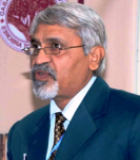Creation and Criticism
ISSN: 2455-9687
(A Quarterly International Peer-reviewed Refereed e-Journal
Devoted to English Language and Literature)
Vol. 05, Joint Issue 16 & 17 : Jan-April 2020

Poetry
The Black Experience and Other Poems — Susheel K Sharma
Dr Susheel Kumar Sharma (1962) has been serving the University of Allahabad as a Professor of English since 2003. He has published four books, thirty-five research papers, five interviews and twenty-eight book-reviews. A collection of more than thirty reviews of his first poetry book, ‘From the Core Within’ (1999, ISBN: 81-85231- 27-3) has been published under the title Bricks and Bouquets (Ed. Sanjeev Kumar, New Delhi: Creative Books, 2008). Prof Sharma’s second collection of poems ‘The Door is Half Open’ (New Delhi: Adhyayan, 2012) has been received very well. Some of his poems have been translated into Assamese, French, Hindi, Lithuanian, Serbian and Turkish languages. Prof. Sharma lives with his family at Vishrut, 5 MIG, Govindpur, Near Uptron Crossing, Allahabad – 211 004, India. He can be contacted through e-mail: susheelsharma.avap@gmail.com.
1. The Black Experience
Even before
I could make out your mien
I started moving towards you.
You were a black patch
In the whites’ territory
Your tongue was red;
It spitted only abuses
And hurled curses on
That short and plump bully trader
Who called himself
A follower of Jesus
And thought himself
To be an angel of mercy.
Where was the god of justice,
When he slyly
Pushed my son away
Into a different cabin?
When I spoke Kingwana
And you Mande, could we talk?
Was any communication possible
Except about our wounds
And agonies?
Yes, we could pray to
Jesus about our welfare;
And he prayed for more profit
To the same lord.
2. Kabir’s Chadar
Unlike Kabir’s chadar
Mine was thickly woven.
Kabir’s was white but mine
Patterned with various beautiful designs
In dark but shining colours.
Who at a young age would like
To exchange it with a white one?
A white one has its own perils
One could not put it anywhere
And everywhere.
However careful one is
In keeping it spotless
It gets a spot or two
Which are pointed out
Even by a blind from a distance.
Mine remains spotless
Even if I put it on the table
In the evening
Or, if I put round me
While travelling in a crowded bus
Or, if I hang it
On the peg
Beyond the reach of
My innocently naughty grandchild.
Even the blood stains of abortion
The burn marks of jealousy
The blotches of over-ambition
The pigments of infamy
The splatter of calumny
The spatter of canards
The invectives of distrust
Go unnoticed on mine.
When it started smelling foul in
My closed house after the rains
I thought of giving it
To the washerwoman.
And she said
It was too dirty to be cleaned
And returned with same brightness.
I did not believe her words.
And put it in my washing machine
Using the powder as advised
By the fair model on my TV set
But, only to be cheated.
How could Kabir
Afford to return his chadar
As he had obtained it?
Does the clue lie in
Thinness or whiteness?
3. A Voice
I
A poem is born
When a novice places
His hand on the mouse
And the cursor shifts quickly
From one position to another.
Instead of clicking on
Love, the word lust is selected.
The movement of the cursor
Is as swift as that of the fingers
From the beloved’s curvy back
To her creamy thighs
On the screen
Flashes a small bed
On which two lovers are caressing each other.
There is a sudden power break-down
The screen turns blank.
The metaphor remains incomplete.
The poem has to start afresh.
II
What do you do
To make your living,
Was a question put to a poet
That made me go spinning.
I wander into the
Realm of monasteries
Thudding hearts and
Drumming minds kept
Carefully stacked in the frozen
Discontents of ancient civilizations
Under the threat of
A nuclear war.
I wonder at the artist
Who creates a poem
From a stone
In the burning sun
With no water
Anywhere around.
I marvel at the
Straight lines on a
Blank white page
That has turned pale
Weathering temperature
That goes up and down
With the movement of the Sun.
Where are the seven
Horses that drive the cart?
What colour do they have?
How heavy are they
What is their mettle/metal?
The clouds are so light
How can they carry
So much of water?
Can water fly
From one continent
To another?
Can prayers fly
To another sky unaided?
How do they bring grace
That pours on the sinners
From various sticks?
I am no Buddha
Nor a Christ
Nor even Hanuman.
Why should someone
Pay me for
Such thorny questions
And sedimented foot-falls?
4. The Unborn Poem
I’m looking for a plumber
To check the leaking of symbols
Which may be stored in
The tank up above in the sky
To be borrowed and
Used at afternoon tea-time
When images have to be
Boiled along with rhyme
And rhythm to be served
With cookies laced with
Black and bitter-sweet
Like chokola memories.
The traffic jam of emotions,
Lines – sweet and sour
And the collision of ideas
Don’t let the pen move.
The poem remains a mirror,
A shadow, a mirage, a stain.
Irony, satire, humour, jamboree
Stare at the enjambment.
The unsoiled paper
Has silver hopes.
The epitaph needs
To precede
The poem.
5. Stories from the Mahabharata
I
Cacophonies of lectures.
Thousands of feet fall.
The fish play under the bridge.
II
Sinners come in hordes.
Vyas bows down to Krishna;
Vaishampayan narrates to purify.
III
Janmejaya decides to live.
Lord Vishnu rests on Sheshnag.
The yajña cannot annihilate cobras.
IV
The sun turns northwards.
Winter descends on Hastinapur.
Ganga is ready to receive her son.
V
Dharma and moksha hang on a tree.
Seers watch avariciously.
Vyas fathers three sons.
VI
Pandu kills a deer.
Kunti becomes a mother.
Gods oblige Madri too.
VII
Blue blood occupies throne.
The maid’s son reads books.
History is rewritten.
VIII
The toddler needs milk.
The mother fools him.
The teacher turns a tutor.
IX
The dog can’t bark anymore.
The tutor shows loyalty.
A Bhil’s son loses his thumb.
X
Is Krishna around?
The princes do not believe.
Draupadi’s honour is saved.
XI
The braid is flowing.
The conch is blowing.
Horses are whinnying.
XII
Thousands of tents stand.
Dharma is discussed every evening.
The queens continue to wail.
XIII
The disciple shoots an arrow.
The Guru blesses.
The battle is won.
XIV
The son is entangled.
The helpless father decides to burn.
The sun shines again.
XV
To make out water in land is difficult.
Suyodhan turns Duryodhan.
Krishna keeps on smiling.
XVI
Arjuna pierces the eye of the fish.
Krishna suggests abduction of Subhadra.
The eyeless king loses hope.
XVII
Karna cheats Parashurama.
Shiva accepts Arjuna as a disciple.
Dushyasan disrobes Draupadi.
XVIII
Keechak is killed with his brothers.
Dharma is re-established.
Balrama does not react.
XIX
Defeated Dharmaraja is a pauper.
He gathers a great army.
No news is a great news.
XX
Krishna is to be imprisoned.
Kunti stops Krishna’s chariot.
Bhishma blesses Pandavas.
XXI
Arjuna abjures his Gandiva.
Krishna displays his cosmic form.
Bhishma reveals the divine secret.
XXII
Abhimanyu dares.
The great warriors rejoice.
Dharma stares into eyes of the eyeless.
XXIII
Sanjay becomes the eye
To trace the layers of silt
In Dhritarashtra’s mind.
XXIV
With eyes bandaged
The queen stood nearby.
Disrobing wasn’t witnessed.
XXV
The prince becomes Brihannala.
Dancing is necessary
To the tune of the flute.


